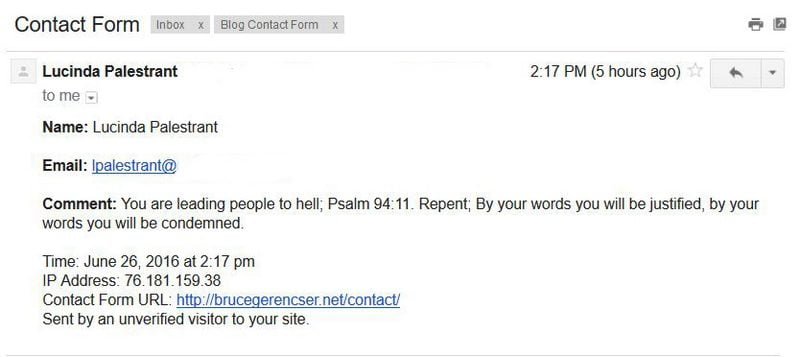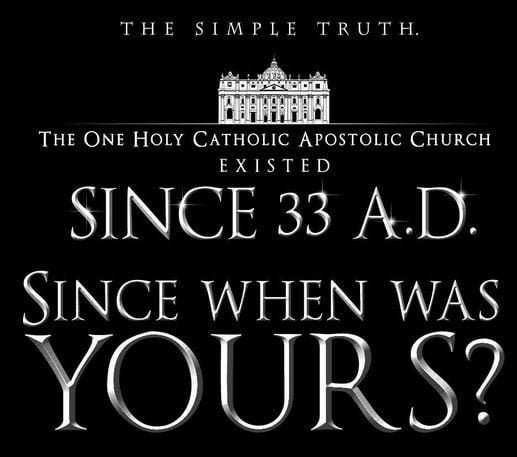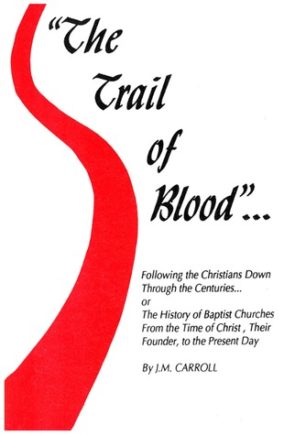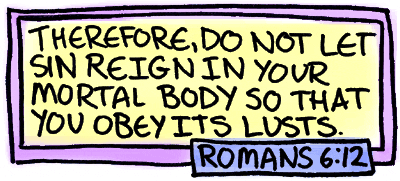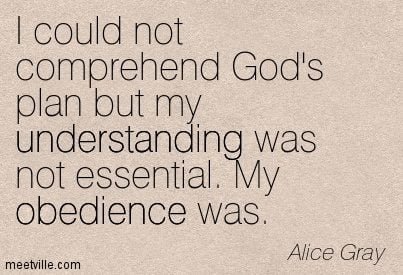
Dr. Patrick Johnston is a former Ohio family practice physician, the founder of the Association of Pro-life Physicians, and the former director of Personhood Ohio (link no longer active). He and his ex-wife Elizabeth have ten children, all of whom are homeschooled. Several years ago, Johnston wrote a rebuttal to a post that I published about my views on abortion and personhood laws. Johnston believes there are no justifiable reasons for women to have abortions. Rape? Nope. Incest? Nope. Life of the mother? Nope or maybe. Severe physical malformation? Nope. Ectopic(tubal) pregnancy? Nope. Huh? That’s right, Johnston does not think women should have access to abortion services if they have ectopic pregnancies. In a December 2015 Personhood Ohio article, Johnston stated (link no longer active):
Many sincere advocates of life fall prey to the argument that abortion is occasionally necessary to save the life of the mother. An example of an ectopic pregnancy is often given. However, a cursory investigation of the evidence reveals that many babies have survived ectopic pregnancies. There are life-saving alternatives to treat the mother and her ectopically-implanted baby. Successful transplantation of the embryo from the Fallopian tube to the uterus has been reported in the medical literature as far back as 1917. We do not have to kill these babies to save the mother. Their cases is [sic] not hopeless.
Johnston also wrote an article for his blog titled Saving Ectopically Implanted Boys and Girls. Yes, really.
Johnston and Personhood Ohio tried for years to amend Ohio’s Constitution. If successful, Article 1, Section 16 would have been amended to say (link no longer active):
(A) The words “person” in Article 1, Section 16, and “men” in Article 1, Section 1, apply to every human being at every stage of the biological development of that human being or human organism, including fertilization.
(B) Nothing in this Section shall affect genuine contraception that acts solely by preventing the creation of a new human being; or human “eggs” or oocytes prior to the beginning of the life of a new human being; or reproductive technology or In Vitro Fertilization (IVF) procedures that respect the right to life of newly created human beings.
So far, right-thinking citizens and politicians have kept the amendment and its subsequent iterations from being enacted.
In an undated article titled Curing the Miseries of the Mind: Anxiety and Depression (link no longer active), Johnston and his now ex-wife Elizabeth offer up advice to those who suffer from mental health problems. According to the Johnstons, the cure for depression and anxiety is found in the Bible:
If you are suffering from severe depression or anxiety, I want to let you know that there is light at the end of your dark tunnel – and it’s not found in a pill! The God who created you loves you, and does not want you to be miserable. I believe that God’s Word – the Holy Bible – holds the key that, if not cures, greatly alleviates psychological symptoms.
Ah yes, the time-tested Fundamentalist maxim: the B-i-b-l-e is the cure for e-v-e-r-y-t-h-i-n-g. Johnston admits that he does “prescribe a lot of medication for anxiety and depression because they help alleviate symptoms,” but he wants people to know that many physical and mental ailments have “spiritual roots.” The Johnstons list seven reasons people suffer from anxiety and depression:
- Genetic and social influences (Yea! Dr. Johnston makes an appeal to science.)
- So that the sufferers faith will be strengthened
- Punishment for sin
- Unforgiveness
- Ingratitude
- Unbelief
- Excessive worry
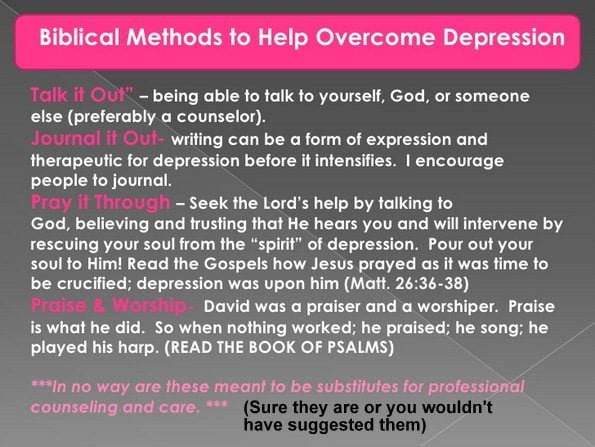
The Johnstons then give their Jesus-infused prescription for overcoming depression. Are you ready to be delivered, fellow depressives? All right, let’s all get h-a-p-p-y! The Johnstons believe that the following tips will help people “overcome the daily onslaught of anxiety and depression”:
- Write out encouraging Bible verses, quotes, or thoughts, and tape them up at your house or work, or carry them in your purse or wallet. Refer to them and memorize them whenever you are struggling with unhealthy thoughts.
- Turn on uplifting Christian music. Sing and meditate on the principles of God’s Word. Praise and worship the Lord. Try dancing to praise music! By all means, turn OFF any music or television that saddens you or causes you to focus on your troubles.
- Make a list of ten things to think about when you are tempted to think things you shouldn’t. Make your list very practical. For instance: “What will I buy at the store?”, “Where will we go on our next vacation?”, “What will I say to my friend/neighbor/family member next time we speak?”, etc. Always have this list on hand to refer to when tempted to be anxious, depressed, or angry.
- Occupy yourself with a big project or many projects that direct your mind off of yourself and onto others. There is no end to the number of nursing home residents, hospitalized patients, struggling families, volunteer organizations, and ministries who need a letter or a helping hand. Do not sit around and wait for your problems to disappear. Busy yourself with projects and invest your time in caring for others.
- Always fight the tendency to pity yourself. You will find one hundred reasons to believe that self-pity will make you feel better but it never solves anything. When tempted to pity yourself, think of others you know who are in much worse circumstances (i.e. the paralyzed teenager, the young husband who just lost his wife, Christians who are persecuted for their faith in China, Cuba, or Indonesia, etc.). Make a list of such people and remind yourself of how blessed you are. Stop and take a moment to pray for those who are less fortunate than yourself.
- Journal!! Write out your thoughts, regardless of how troubling or embarrassing they may be. Often, when you see on paper what is going on in your head, you will be surprised by how manageable your problem is through changing your way of thinking!
- A few good Scriptures on topics of importance are listed below for your edification. Suffering: 1 Pet. 4:12-16, Rom. 8:17-18, 2 Cor. 4:17, James 1:2-4 Forgiveness/Mercy: Matt. 6:14-15, Matt. 18:21-22, Heb. 8:12, Prov. 11:19, James 5:9 Thankfulness: Phil. 4:11, Heb. 13:5, Rom. 1:21 Fear/Worry/Doubt: Matt. 6:25-34, Phil. 4:6-7, 2 Tim. 1:7, I Cor. 10:13
Certainly, some of the advice offered by the Johnstons can often help alleviate the effects (not the cause) of anxiety and depression. However, make no mistake about it, the Johnstons believe that the Christian God and the Bible are the CURE for those suffering from mental difficulties. I suspect that Dr. Johnston tells depressives who are not Christians that Jesus can and will cure what ails them. For those who are Christians, Johnston tells them to put mind over matter and remember that there are always people worse off than you. Trust Jesus and all will be well.
If Johnston is prescribing God and the Bible as a cure for anxiety and depression then he is committing medical malpractice. His patients should expect treatment by a doctor thoroughly grounded in the scientific method. Using the tips mentioned above to “cure” depression might work for a time, but true healing comes through counseling, behavior modification, and, if warranted, psychotropic drugs. As someone who has suffered from depression for most of my adult life — both as a Christian pastor and as an atheist — I know that the sort of Christian voodoo offered by Johnston does not cure depression. If Johnston objects to what I have said here, he is free to present empirical data that suggests otherwise. Until then, Dr. Johnston’s tips for curing anxiety and depression should be viewed in the same light as the chants and gimmickry of witch doctors.
Note
We know the Johnstons personally. We attended church with them in 2004-2005 at Faith Bible Church in Jersey, Ohio. Faith Bible is a family-centric, Reformed Baptist congregation.
Elizabeth filed for divorce in 2020, saying “he [Patrick] has been repeatedly unfaithful to me, as well as psychologically and emotionally abusive.”
After repeatedly taking him back, covering for him, preserving his reputation, and forgiving him of adultery, pornography and sexual immorality, which began 16 years ago, I have been forced to come to the harsh realization that I’ve done all I can and am entrusting Him to my Savior! I don’t share this to harm or humiliate, but to help explain why I, a Christian woman who hates divorce, have decided to separate and pursue a divorce.
The deception and aggression has recently gotten very unhealthy, so I am being forced for the sake of my children to make the hardest decision of my life. To stay at this point would be more harmful to my children than to separate. I will be blasted for not staying married. Don’t listen to the critics, and just pray for us instead.
Bruce Gerencser, 66, lives in rural Northwest Ohio with his wife of 45 years. He and his wife have six grown children and thirteen grandchildren. Bruce pastored Evangelical churches for twenty-five years in Ohio, Texas, and Michigan. Bruce left the ministry in 2005, and in 2008 he left Christianity. Bruce is now a humanist and an atheist.
Connect with me on social media:
Your comments are welcome and appreciated. All first-time comments are moderated. Please read the commenting rules before commenting.
You can email Bruce via the Contact Form.

